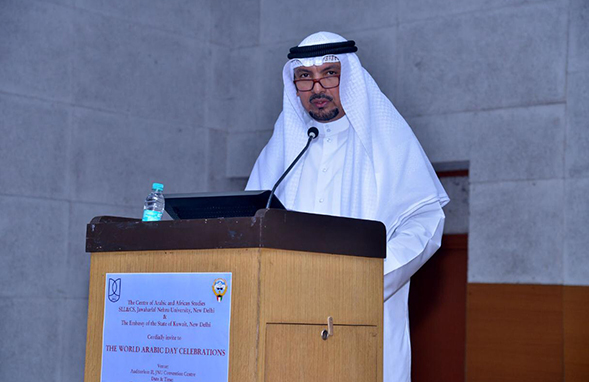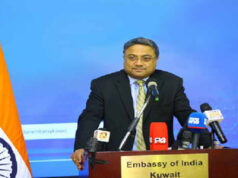
The Ambassador of the State of Kuwait to India, H.E. Jasem I. Al-Najem spoke about his vision and key priorities for enhancing the bilateral relationship between India and the State of Kuwait in the coming months. He also highlighted the strong historic bond between the two countries, outlining ways to increase cultural and economic exchange
- His Excellency, you recently joined the Embassy in October, last year. What will be your key priorities in the forthcoming months?
I’m dealing with a strong historical relationship between India and Kuwait and I’m here to strengthen ties in areas like economy, culture and politics. Business, Investment and Trade are top priorities. The economic aspects of the relationship can be strengthened further and will definitely be a key objective. Luckily, the two friendly countries have had no misunderstanding since their respective independence. There is, in fact, a harmony in politics between the nations. It is our mission to increase trade and encourage more high-level visits to enhance cooperation.
- Kuwait and India share a warm bilateral relation. In October 2018, Indian External Affairs Minister Sushma Swaraj held talks with her Kuwaiti counterpart, His Excellency Sheikh Al Khalid Al Sabah in Kuwait. What value do you attach to these bilateral meetings?
Bilateral meetings are of utmost importance, we signed two agreements during the recent visit by Indian Foreign Minister Sushma Swaraj. The first was to organise labour, which was adopted very quickly by the Indian Parliament. And the second agreement seeks to implement passport-free travel between the countries. We are currently discussing greater military cooperation and an agreement is likely to be signed soon, either in Delhi or Kuwait. In the past, the Kuwaiti Amir visited India in 2006 and we are looking at another possible visit in 2019. The Kuwaiti Prime Minister was in India in 2013, and the Indian Vice President visited Kuwait in 2009. Additionally, the Kuwaiti Minister of Social Affairs and Labour was in India in October 2018. There are 31 agreements between India and Kuwait and as an ambassador, it is my goal to increase the number of agreements. For example, since the number of Indian citizens in Kuwait has gone up over the years, we are now looking at increasing the number of seats reserved for Indians in national airways. The 2006 agreement allows reservation of twelve thousand seats per week but with an increase in the Indian population in Kuwait, more space must be given to Indians in the Kuwaiti airlines. The Kuwaiti Civil Aviation Minister also attended the Global Aviation Summit held in Mumbai, where he discussed the aviation aspect of the Kuwait 2035 vision. The task at hand is to focus on the implementation of the agreements signed so far and encourage further agreements.
- Embassy of the State of Kuwait recently conducted a cultural program, in association with Jawaharlal Nehru University, New Delhi, to deepen cultural ties through the Arabic language. Will you kindly highlight some of the key developments of such an alliance?
It was the National Arabic Day in December. We couldn’t do it in December, so we postponed it to January starting at the Jawaharlal Nehru University. It was a culturally significant event encouraging direct interaction with the students, starting a dialogue about the value of Arabic language. Similar events about the historic relationship between India and Kuwait can be curated across Indian universities like Jamia Millia or Ambedkar University to strengthen ties. The key goal is to promote Kuwaiti culture. Over the years, Kuwait has assumed a humanitarian role and humanitarian values of the country must be shared with the students. I think we should also focus on translation for literature, from Arabic to English or even to Hindi or Urdu. We have a council for art and culture, which can play a role in the translation of texts for greater exchange. Visiting universities and establishing cultural events would increase interaction with students on both sides. Even food festivals and book fairs can play a significant role in exchanging ideas and understanding how Indian students view Kuwait. I hope we can be successful in curating such events and show the Indian students the real Kuwait. The youth is the future and so it is important for them to know more about Kuwait and the Middle East. Through culture exchange, we can learn more about politics as well.
- What is your message for the readers of Diplomacy & Beyond Plus magazine?
Kuwait always pushes for peace, we do believe, only through the peace processes you can find a solution to a crisis and not through military action. We encourage charitable and humanitarian contributions across the globe. An additional message would be, keep reading Diplomacy and Beyond Plus. It is a great monthly issue to subscribe to for junior diplomats or senior diplomats from around the world and within India, in order to catch up with what’s going on in the diplomatic world and for gaining an overall perspective. I found that it’s an important source of information for understanding the monthly developments about global concerns, culture, social change, and country-specific reports.








